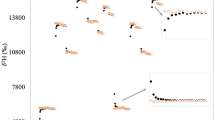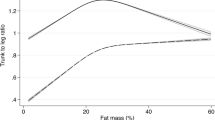Abstract
BECAUSE DDT is highly soluble in lipids, and therefore stored preferentially in body fat, it is often said to “accumulate in fat”. This phrase incorrectly implies that the storage process is progressive and irreversible. Population surveys have shown no increase in DDT concentration in human fat from US residents over the past 15 yr of continuing contamination of food1–4. Feeding experiments have also demonstrated in several mammalian species, including man, that the storage process is reversible5–9. Identification of the metabolite DDA (bis[p-chlorophenylacetic acid]) in human urine demonstrated the existence of a mechanism for DDT excretion as early as 1946 (ref. 10).
This is a preview of subscription content, access via your institution
Access options
Subscribe to this journal
Receive 51 print issues and online access
$199.00 per year
only $3.90 per issue
Buy this article
- Purchase on Springer Link
- Instant access to full article PDF
Prices may be subject to local taxes which are calculated during checkout
Similar content being viewed by others
References
Hayes, jun., W. J., Quinby, G. E., Walker, K. C., Elliott, J. W., and Upholt, W. M., Amer. Med. Assoc. Arch. Indust. Health, 18, 398 (1958).
Kraybill, H. F., Canad. Med. Assoc. J., 100, 204 (1969).
Durham, W. F., Armstrong, J. F., and Quinby, G. E., Arch. Envir. Health, 11, 641 (1965).
Duggan, R. E., Lipscomb, G. Q., Cox, E. L., Heatwole, R. E., and Kling, R. C., Pesticides Monitoring J., 5 (2), 73 (1971).
Durham, W. F., Ortega, P., and Hayes, jun., W. J., Arch. Intern. Pharmacodynamie, 141 (1–2), 111 (1963).
Datta, P. R., and Nelson, M. D., Toxic Appl. Pharmacol., 13, 346 (1968).
Deichmann, W. B., Keplinger, M., and Dressler, I., Toxic Appl. Pharmacol., 14, 205 (1969).
Hayes, jun., W. J., Dale, W. E., and Pirkle, C. I., Arch. Envir. Health, 22(1) 119 (1971).
Morgan, D. P., and Roan, C. C., Arch. Envir. Health, 22(3), 301 (1971).
Neal, P. A., Sweeney, T. R., and Von Oettingen, W. F., Public Health Reports, 61(12), 403 (1946).
Hayes, jun., W. J., Ann. Rev. Pharmacol., 5, 27 (1965).
Roan, C. C., and Morgan, D. P., Arch. Envir. Health, 22(3), 309 (1971).
Mills, P. A., J. Assoc. Official Agricultural Chemists, 44, 171 (1961).
Mills, P. A., Onley, J. H., and Gaither, R. A., J. Assoc. Official Agricultural Chemists, 46, 186 (1963).
Jensen, J. A., Cueto, C., Dale, W. E., Rothe, C. F., Pearce, G. W., and Mattson, A. M., Agricultural and Food Chemistry, 5 (12), 919 (1957).
Morgan, D. P., and Roan, C. C., Arch. Envir. Health, 20, 452 (1970).
Wedemeyer, G., Appl. Microbiol., 15 (3), 569 (1967).
Author information
Authors and Affiliations
Rights and permissions
About this article
Cite this article
MORGAN, D., ROAN, C. Loss of DDT from Storage in Human Body Fat. Nature 238, 221–223 (1972). https://doi.org/10.1038/238221a0
Received:
Revised:
Issue Date:
DOI: https://doi.org/10.1038/238221a0
This article is cited by
-
Long-term occupational exposure to DDT
International Archives of Occupational and Environmental Health (1981)
-
Long-term studies of the excretion of polychlorinated biphenyls (PCBs) through the mother's milk of an occupationally exposed worker
Archives of Environmental Contamination and Toxicology (1978)
-
Metabolism of low oral doses of DDT and DDE by tame mule deer fawns
Bulletin of Environmental Contamination and Toxicology (1975)
Comments
By submitting a comment you agree to abide by our Terms and Community Guidelines. If you find something abusive or that does not comply with our terms or guidelines please flag it as inappropriate.



